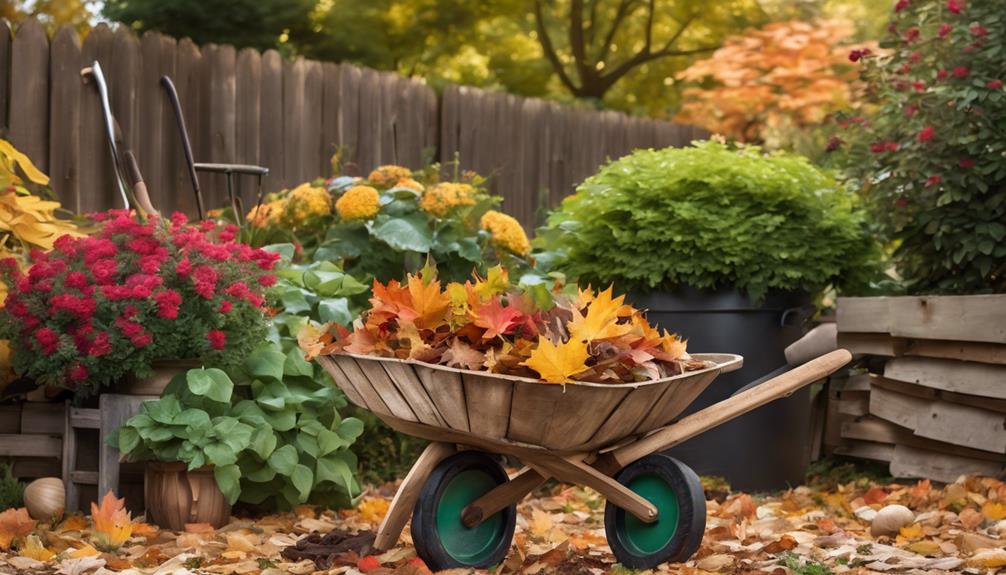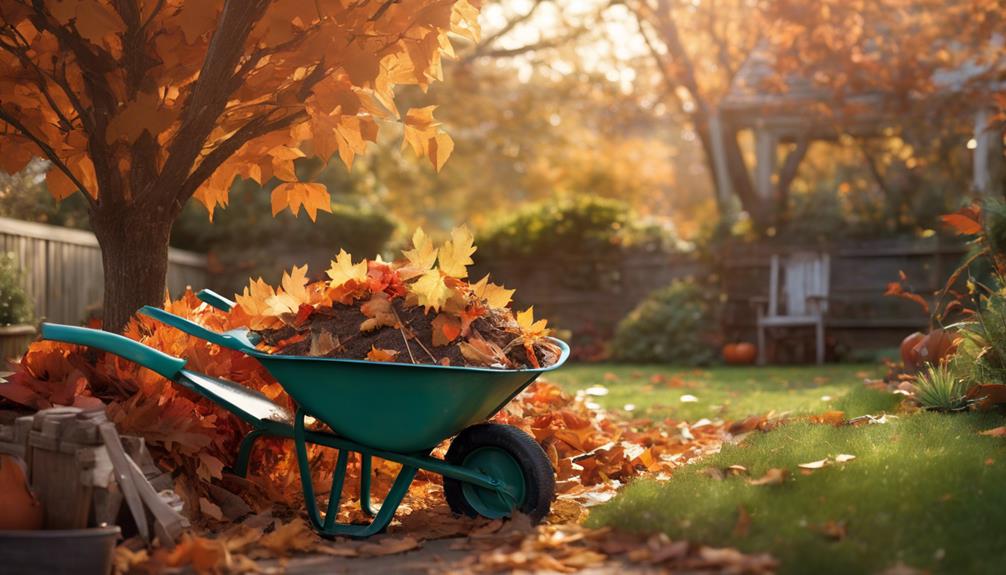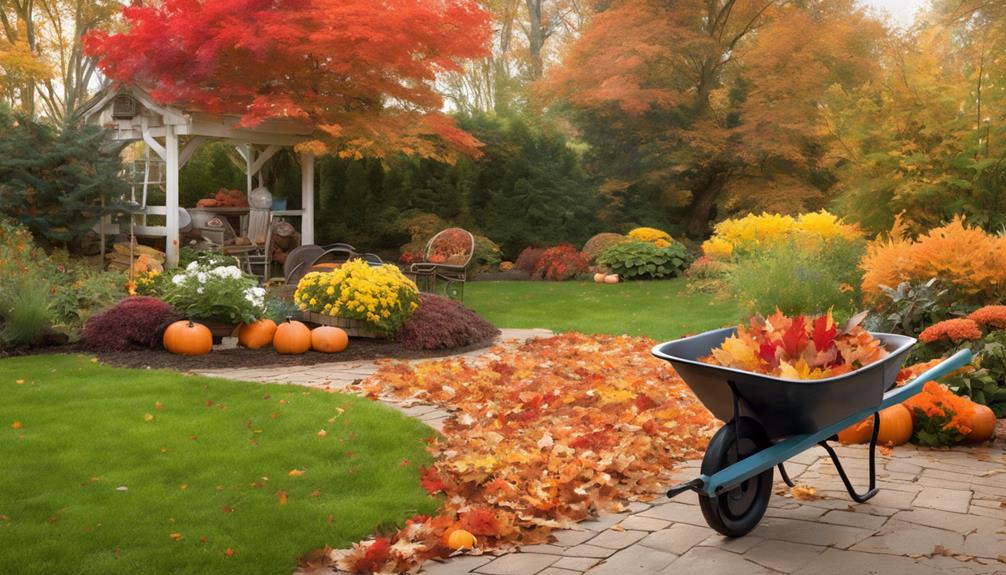
How to Care for Your Garden’s Trees Organically
20 January 2025
3 Best Reasons to Maintain Your Garden Regularly
21 January 2025Finding local professionals for your seasonal garden cleanup is essential for maintaining a vibrant outdoor space.
Experienced gardeners can efficiently handle debris removal, pruning, and soil assessment, ensuring the health of your plants. They are equipped with the necessary tools and knowledge to carry out proper irrigation checks and mulch application, which aids in moisture retention and soil health.
A professional touch not only enhances the aesthetic appeal of your garden but can also increase your property value.
Explore the various benefits and expert services available in your area to elevate your garden's potential and beauty.
Seasonal Garden Maintenance Essentials
To ensure a flourishing garden throughout the seasons, a comprehensive seasonal cleanup checklist is essential.
This checklist not only details key tasks but also specifies the necessary tools for effective maintenance.
Seasonal Cleanup Checklist
As the seasons change, a thorough garden clean-up becomes essential to prepare your outdoor space for the months ahead.
Begin by removing debris such as fallen leaves, dead plants, and weeds, as they can harbour pests and diseases.
Prune perennials and shrubs to promote healthy growth and shape your garden effectively.
Assess your soil's condition; aerate and amend as necessary to guarantee ideal nutrient availability.
Check your irrigation system for leaks or blockages, ensuring efficient water distribution.
Ultimately, consider planting cover crops or mulching to protect your soil from erosion and temperature fluctuations.
This detailed checklist will not only enhance the aesthetic appeal of your garden but also fortify its resilience against the challenges posed by changing seasons.
Essential Tools Needed
Success in seasonal garden maintenance relies heavily on having the right tools at your disposal. Essential implements include a sturdy rake for gathering leaves and debris, a sharp pair of pruning shears for precise cuts, and a reliable spade for digging and transplanting.
A quality garden fork is indispensable for aerating soil, while a hand trowel provides accuracy in smaller tasks. Moreover, consider investing in a durable wheelbarrow for efficient material transport.
Protective gear, such as gardening gloves and kneepads, ensures safety and comfort during prolonged tasks. Finally, an effective hose or watering system is crucial for maintaining hydration across your plants.
Equipping yourself with these tools will greatly enhance your gardening efficiency and effectiveness, allowing for a thriving seasonal landscape.
Timing of Seasonal Cleanups
Timing is essential for effective seasonal clean-ups, as it directly impacts soil condition assessment, pest and weed management, and mulching for moisture retention.
Proper scheduling ensures that gardeners address these factors at optimal moments, enhancing the overall health and productivity of the garden.
Understanding the seasonal cycles will assist in making informed decisions for a successful clean-up process.
Soil Condition Assessment
A thorough soil condition assessment is essential for determining the perfect timing of seasonal clean-ups in your garden.
Evaluating soil health allows for informed decisions on when to carry out clean-ups, ensuring optimal conditions for plant growth and vigour.
By examining factors such as moisture content, nutrient levels, and pH balance, gardeners can strategically plan their clean-ups to improve soil structure and fertility.
- Conduct a soil test to analyse nutrient composition.
- Monitor moisture levels to prevent erosion and compaction.
- Examine organic matter content for enhanced soil health.
Pest and Weed Management
Effective pest and weed management is vital for the overall health of your garden and can significantly influence the timing of seasonal clean-ups.
Implementing a strategic approach to these challenges ensures that your garden remains robust and free from infestations, ultimately enhancing its aesthetic appeal and productivity.
Consider the following key practices:
- Monitor Pest Activity: Regularly inspect plants for early signs of pests to initiate timely intervention.
- Weed Control Timing: Address weeds before they set seed, which can prevent future infestations and reduce competition for nutrients.
- Seasonal Awareness: Schedule clean-ups around critical periods in pest life cycles, ensuring maximum effectiveness of management strategies.
Mulching for Moisture Retention
Enhancing moisture retention through mulching is a vital practice for maintaining a healthy garden, particularly during seasonal clear-ups. Proper mulching not only conserves soil moisture but also suppresses weeds and regulates soil temperature.
Timing your mulching application is important to maximise its benefits; ideally, it should be done after autumn clear-ups or early spring planting.
Consider these key aspects when mulching for moisture retention:
- Material Selection: Choose organic materials like wood chips or straw, which decompose over time and enrich the soil.
- Layer Thickness: Apply a 5-10 cm layer to effectively retain moisture while allowing water to permeate.
- Maintenance: Regularly replenish mulch to maintain its effectiveness and ensure optimal moisture conservation.
Tools for Effective Cleanup
Effective seasonal garden clean-up begins with the right tools to prepare the area for rejuvenation.
Utilising compost not only aids in enriching the soil but also improves overall garden health.
Furthermore, incorporating organic pest control methods guarantees a sustainable approach to maintaining a thriving garden ecosystem.
Initial Cleanup Preparation
A successful seasonal garden cleanup begins with the right tools, ensuring that the process is efficient and thorough.
Preparing your workspace and assembling the necessary tools can significantly enhance your effectiveness.
The following items are essential for an ideal initial cleanup:
- Pruning Shears: Perfect for trimming dead branches and overgrown plants, promoting healthier growth.
- Rake: A versatile tool for gathering leaves, debris, and grass clippings, ensuring a tidy garden bed.
- Gloves: Protect your hands while providing grip and dexterity when handling various materials.
Compost for Soil Enrichment
Composting serves as a crucial component for enriching garden soil, contributing to a healthier and more productive growing environment.
By converting organic waste into nutrient-rich compost, gardeners can significantly improve soil structure, moisture retention, and biodiversity. This process not only reduces landfill waste but also fosters a sustainable gardening practice.
To optimise the benefits of composting, consider the following:
- Diverse Materials: Incorporate a mix of greens (nitrogen-rich) and browns (carbon-rich) to create a balanced compost.
- Aeration Techniques: Regularly turn the compost pile to ensure adequate oxygen flow, promoting faster decomposition.
- Moisture Management: Maintain an ideal moisture level to support microbial activity without creating anaerobic conditions.
Embracing composting elevates your gardening practice to new heights.
Organic Pest Control Methods
Maintaining a thriving garden involves not just enriching the soil but also protecting plants from pests that can undermine their health.
Employing organic pest control methods is crucial for sustainable gardening, as these techniques effectively manage pest populations while preserving the ecosystem.
- Beneficial Insects: Introduce ladybirds and lacewings, which prey on aphids and other harmful insects.
- Neem Oil: This natural pesticide disrupts the life cycle of pests without harming beneficial organisms.
- Companion Planting: Strategically planting certain species together can deter pests; for example, marigolds repel nematodes and a variety of insects.
Increased Property Value
Enhancing the aesthetic appeal of a property through seasonal garden cleanup can significantly increase its market value. A well-maintained garden not only attracts potential buyers but also reflects a homeowner's commitment to property upkeep. This can lead to higher offers and quicker sales.
| Aspect of Cleanup | Impact on Property Value |
|---|---|
| Removal of Debris | Creates a clean appearance |
| Pruning Overgrown Plants | Improves visual appeal |
| Mulching | Enhances soil health |
| Seasonal Planting | Adds vibrant colour |
| Lawn Care | Increases curb appeal |
Investing in professional seasonal garden cleanup is a strategic move that pays dividends, ensuring your property stands out in a competitive market while fostering long-term value retention.
Smart Irrigation System Installation
The installation of a smart irrigation system is essential for optimising water usage in seasonal garden maintenance.
By employing advanced scheduling techniques, integrating rain sensor technology, and enabling automated watering adjustments, homeowners can enhance both the health of their gardens and overall water efficiency.
These innovations not only promote sustainable gardening practices but also contribute to long-term cost savings.
Smart Irrigation Scheduling Techniques
Implementing effective irrigation scheduling techniques can greatly optimise water usage and promote healthier plant growth. By utilising advanced scheduling methods, gardeners can ensure that plants receive the appropriate amount of water at the right times, enhancing their resilience and vigour.
Key techniques to consider include:
- Soil moisture monitoring: Utilise sensors to assess soil moisture levels, allowing for precise irrigation based on actual needs.
- Evapotranspiration data: Analyse weather conditions and plant water requirements to adjust schedules accordingly, minimising waste.
- Time-of-day watering: Schedule irrigation during early morning or late evening to reduce evaporation losses and ensure maximum absorption.
Mastering these techniques can lead to a more sustainable gardening practice, conserving water and fostering a thriving landscape.
Rain Sensor Technology
The integration of rain sensor technology into irrigation systems represents a significant advancement in sustainable gardening practices. This groundbreaking technology detects moisture levels in the environment and automatically adjusts irrigation schedules accordingly, preventing unnecessary water usage.
By incorporating rain sensors, gardeners can optimise water efficiency, conserve resources, and promote healthier plant growth.
- Improves water conservation by preventing overwatering.
- Reduces the frequency of manual adjustments needed for irrigation systems.
- Promotes environmental stewardship, aligning gardening practices with sustainability principles.
As the demand for efficient irrigation solutions grows, the adoption of rain sensor technology becomes imperative for those seeking mastery in modern garden management.
Embracing this technology not only benefits individual gardens but also contributes positively to the broader ecosystem.
Automated Watering Adjustments
Integrating automated watering adjustments into garden management systems can greatly improve irrigation efficiency and reduce water waste.
Smart irrigation systems utilise advanced technology to enhance water delivery based on real-time environmental conditions. By employing soil moisture sensors, weather forecasts, and programmable timers, these systems ensure that plants receive the precise amount of water needed for optimal growth.
- Soil Moisture Monitoring: Continuously assesses soil hydration levels, preventing over- or under-watering.
- Weather Adaptability: Adjusts watering schedules based on rainfall predictions and temperature fluctuations.
- Remote Control: Provides users with the ability to manage irrigation settings via smartphone applications, enhancing convenience and accessibility.
Implementing such technology not only conserves resources but also promotes a healthier, more resilient garden ecosystem.
Weather-Related Cleanup Delays
Weather-related delays can pose significant challenges for seasonal garden cleanup, necessitating effective strategies to maintain productivity.
Implementing rainy day cleanup strategies and utilising weather-resistant equipment can help mitigate these disruptions.
Furthermore, adapting to unexpected weather changes is essential for ensuring that garden maintenance tasks are completed efficiently and on schedule.
Rainy Day Cleanup Strategies
Unexpected rain showers can disrupt even the best-laid plans for seasonal garden cleanup, leaving homeowners searching for effective strategies to manage these weather-related delays.
To ensure that your gardening efforts remain productive despite the rain, consider the following strategies:
- Prioritise Tasks: Focus on indoor or sheltered tasks such as organising tools, planning future layouts, or preparing soil amendments.
- Utilise Breaks in Rain: Monitor weather patterns closely and take advantage of brief dry spells to complete quick outdoor tasks, such as pruning or weeding.
- Embrace the Water: Use the rain to your advantage by allowing it to assist with watering newly planted areas or removing debris washed into garden beds.
Weather-Resistant Cleanup Equipment
Adverse weather conditions can significantly impact garden maintenance, making it essential for homeowners to invest in weather-resistant cleanup equipment.
This specialised equipment not only enhances efficiency but also ensures durability and reliability during inclement weather. Selecting the right tools can reduce delays and optimise performance, enabling timely garden maintenance regardless of the elements.
- Waterproof tarpaulins: Crucial for protecting plants and collecting debris during rainfall.
- Rust-resistant tools: Investing in high-quality stainless steel or coated tools extends their lifespan.
- Heavy-duty rubbish bags: These bags are designed to endure wet conditions, ensuring safe disposal of garden waste.
Adapting to Unexpected Weather Changes
Frequent shifts in weather can disrupt even the most meticulously planned garden clean-up schedules, necessitating quick adaptations by homeowners.
To effectively manage these interruptions, it is crucial to remain informed about local forecasts and prepare for sudden changes. Implementing flexible strategies ensures that your gardening efforts are efficient and effective despite unforeseen weather events.
- Monitor Weather Patterns: Utilise reliable weather apps to stay updated on potential storms or temperature drops.
- Adjust Clean-up Priorities: Focus on fundamental tasks initially, such as debris removal, to improve yard aesthetics quickly.
- Utilise Professional Help: Engage local professionals who can provide timely assistance and expertise when weather disrupts your plans.
Why Choose TKL Birmingham Gardener
When considering a reliable partner for your seasonal garden cleanup, TKL Birmingham Gardener stands out due to its commitment to excellence and customer satisfaction.
With a proven track record of transforming outdoor spaces, TKL employs skilled horticulturists who bring a wealth of knowledge and expertise to each project. Their tailored approach ensures that every garden receives the specific attention it requires, whether it involves meticulous pruning, thorough debris removal, or soil improvement.
Additionally, TKL adopts sustainable practices, promoting ecological balance and enhancing garden longevity. Clients benefit from their transparent communication and punctual service, fostering trust and reliability.
Choosing TKL Birmingham Gardener guarantees not only a pristine garden but also a partnership rooted in quality and professionalism, setting a benchmark in the gardening industry.
Common Gardening Questions Answered
Many gardening enthusiasts often find themselves seeking answers to common questions that arise during seasonal maintenance.
One frequent query pertains to the ideal timing for pruning perennials; generally, this should be done in late winter or early spring before new growth begins.
Moreover, many wonder about the best practices for soil amendment. Incorporating organic matter, such as compost, improves soil structure and fertility.
Another common concern is pest management; integrated pest management techniques, including the use of beneficial insects, can effectively minimise infestations while maintaining ecological balance.
Ultimately, gardeners often ask about the proper watering techniques; deep, infrequent watering promotes robust root development.
Addressing these questions can enhance your gardening proficiency and ensure a thriving seasonal landscape.
Schedule Your Cleanup Today
As the seasons change and your garden enters a period of dormancy, scheduling your cleanup today is vital for ensuring a healthy and vibrant landscape come spring.
Timely cleanup not only enhances the aesthetic appeal of your garden but also promotes soil health and prevents pest infestations.
Engaging professionals can guarantee thorough and efficient work, allowing you to focus on your gardening aspirations.
- Assess your garden's specific needs for optimal care.
- Develop a comprehensive cleanup plan tailored to your landscape.
- Utilise the expertise of local professionals for quality results.




